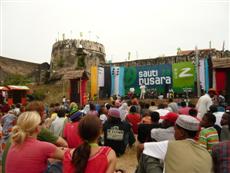SAUTI ZA BUSARA
Sauti za Busara means Sounds
of Wisdom and is certainly growing into a music festival worthy of such a name. Held annually in Stone Town
on the romantic island
of Zanzibar Zanzibar hosted Sauti za Busara, East Africa’s largest
music festival showcasing talent from around Africa
but with a particular emphasis on East African artists.
festival during the day
Around festival time, the
island is buzzing with a range of fringe events: traditional ngoma drum and
dance, fashion shows, dhow races, open-mic sessions, after-parties and
performances of Zanzibar
It is easy to see why tourists and
international visitors flock to the festival in such great numbers. Pitched as
the “friendliest festival in the world”, the relaxed vibe ensures that Sauti za
Busara lives up to this reputation. Large numbers of children and families at
the afternoon and evening events contribute to the welcoming feel. The festival
is entirely live, featuring talented and energetic performers. And an exciting
range of music is performed, from traditional Zanzibar Taarab to spirit dancers
to urban hip-hop.
International visitors enjoying the festivalHowever, Sauti za Busara is not merely a tourist festival or an internationally-focused event. It also aims to engender respect for local music among the local population. Currently, very few Tanzanian radio stations play African music, focusing instead on American and international artists. The festival directors hope that by showcasing African music on an international platform, local people will understand that they have something “very special, very unique and very valuable
Bi. Kidude from Zanzibar
“Festivals invigorate young people’s interest in local
culture, give opportunities for artists and music professionals to meet and
learn from each other, keep traditions alive, create employment for local
people and promote Zanzibar
Youth in FestivalSauti za Busara is based within the Old Fort in
Zanzibar
Today the Old Fort is used as a cultural centre, hosting many Tanzanian drumming or dancing classes, films, music and dance events and much more. The crumbling stone battlements and crenellated towers provide incredibly atmospheric surroundings in which to hold a music festival. The lighting illuminates the ancient walls, and the sounds of African beats reverberate within the historical arena. Sauti za Busara could not have chosen a more perfect location in which to base the Zanzibar Music Festival.
Tumi & The Volume from South Africa perfoming
Sauti za Busara relies on keeping an appropriate balance between local and international visitors. One of the reasons that international visitors like the festival so much is that it isn’t just an event for tourists, but provides “African music under African skies”, as well as an at least partly African audience. Alongside showcasing a wealth of East African music and trying to engender respect for that music, the importance of local audiences is crucial to the festival's aims.
Audience
The next few editions of the festival will almost certainly be friendly and fun as per usual, and the quality and energy of music is sure to attract ever-greater crowds. However, Sauti za Busara risks becoming a victim of its own well-deserved success. Festival organizers will face many challenges as they work to keep the vital local element from being overwhelmed by ever increasing numbers of international visitors
Ndere Ugandan Dancers
Nneka from Nigeria
Ogoya Nengo from Kenya
ENJOYABLE SCENES
Tandaa Traditional Group from Zanzibar
-Carnival Street Parade: the biggest parade to hit
Cultural perfomances after parade
-Festival
marketplace: local food and drinks,
music, jewellery, clothing and handicrafts.
-African Films: documentaries,
music clips, videos and live concert footage. African film makers entering their
works to the festival, vying for honors.
Urban Hip Hop perfomance
-Seminars and Training
Workshops: Building skills for
artists, managers, music journalists, filmmakers, sound and lighting
technicians from the East Africa region.
ENJOY
THE AFRICAN RHYTHM IN THE SPICE
ISLAND



KJL.jpg)









_by_Robin_Batista_0754.jpg)























No comments:
Post a Comment